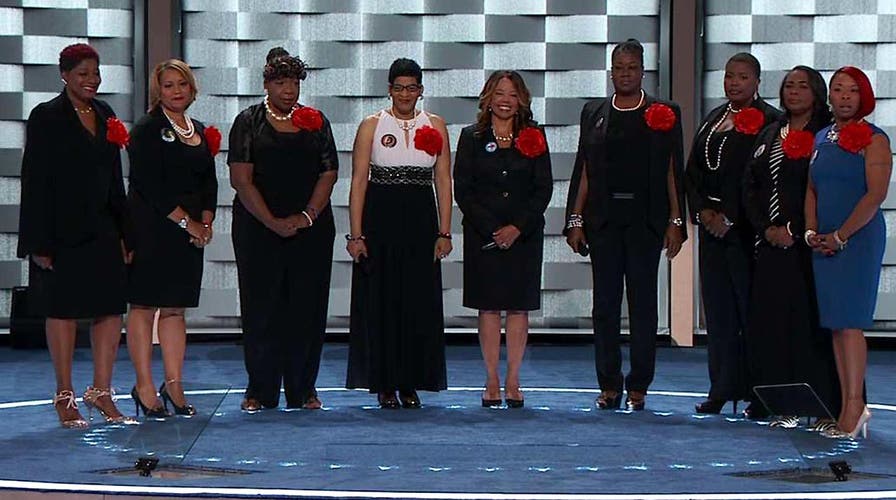Full speech: 'Mothers of the Movement' address 2016 DNC
The mothers of Eric Garner, Trayvon Martin, Jordan Davis, Mike Brown, Hadiya Pendleton, Dontré Hamilton and Sandra Bland make the case for Hillary Clinton at the Democratic National Convention
On Tuesday, the Democratic National Convention dedicated it's programming to the theme Mothers of the Movement. The evening was meant to highlight the visceral impact of violence and police brutality in society.
During a ten-minute prime time block, convention delegates and viewers at home heard speeches and watched videos featuring the mothers of Trayvon Martin, Michael Brown, Eric Garner, Sandra Bland, and others.
What the speakers had in common was that they had each lost a loved one to violence — most often in the examples cited following a violent encounter with police.
"So many of our children are gone, but they are not forgotten," said Geneva Reed-Veal, the mother of Sandra Bland.
While no one can question the pain of losing a loved one to violence, no matter the circumstances, the broader conversation on policing in society, violence, and social dysfunction must acknowledge the weight of the pain and sacrifice felt by members of the law enforcement community and their loved ones as well.
Bland died in-custody in July, 2015 at the Waller County Jail in Texas. Her death was ultimately ruled a suicide.
While no one can question the pain of losing a loved one to violence, no matter the circumstances, the broader conversation on policing in society, violence, and social dysfunction must acknowledge the weight of the pain and sacrifice felt by members of the law enforcement community and their loved ones as well.
Where is the balance when almost no mention is given to the families of the brave men and women who have died in the line of duty while protecting our communities from the very violence being condemned? Violence that, to date, has resulted in almost 70 police officers lost so far this year.
Where was the platform for the mothers, wives, and children of the 8 police officers assassinated in Dallas and Baton Rouge?
Who spoke on their behalf?
Or what about the platform offered to brave women like Maureen Faulkner, whose husband Daniel, a Philadelphia police officer, was gunned down in cold blood by Mumia Abu-Jamal on December 9, 1981?
Mrs. Faulkner has spent the past 35 years reliving the tragic loss of her husband while misguided activists rally behind the man who ended his life — an unrepentant cop killer.
Where was her platform?
And what about the hundreds of Americans who each year experience the anguish associated with losing a beloved member of the law enforcement community to violence — heroes whose only blame was that that they stood up and answered the call to protect and serve.
Where was their voice?
It is important to acknowledge the difficulties facing our society today — violence has become untenable in many of our nation's largest cities and police and community relations have reached a generational nadir.
And to be certain, acknowledging and rooting out legitimate police misconduct, when the totality of facts and evidence support such a conclusion, is a laudable goal.
But, so is recognizing that our nation's law enforcement community is doing a remarkable job under increasingly difficult and dangerous conditions — a recognition that our men and women in blue feel under attack and under-appreciated.
To overemphasize the former while almost wholly ignoring the latter was a sad and unfortunate missed opportunity at Tuesday’s Democratic National Convention.
Regrettably, it also failed to help move our public discourse away from a conversation predicated upon division and mistrust and toward one that inspires a sense of reconciliation and mutual understanding.
A missed opportunity indeed.

